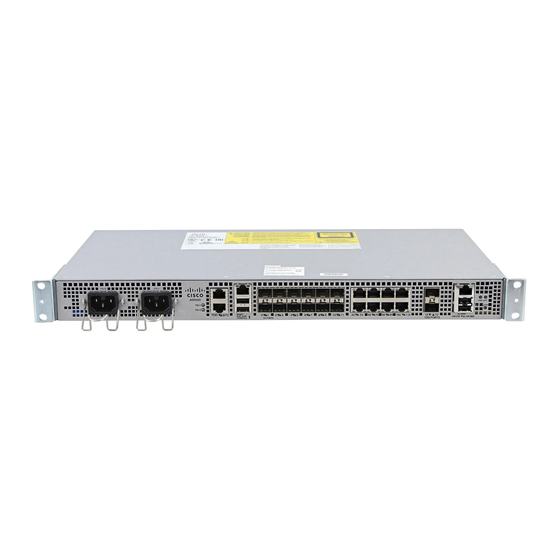Cisco ASR-920-4SZ-D Руководство по конфигурации - Страница 2
Просмотреть онлайн или скачать pdf Руководство по конфигурации для Переключатель Cisco ASR-920-4SZ-D. Cisco ASR-920-4SZ-D 13 страниц. Aggregation services router
Также для Cisco ASR-920-4SZ-D: Руководство по установке оборудования (46 страниц)

Revised: December 6, 2017,
Autonomic Networking
Autonomic Networking makes network devices intelligent by introducing self-management concepts that simplify network management
for the network operator.
Finding Feature Information
Your software release may not support all the features documented in this module. For the latest caveats and feature information, see
Bug Search Tool
and the release notes for your platform and software release. To find information about the features documented in
this module, and to see a list of the releases in which each feature is supported, see the feature information table.
Use Cisco Feature Navigator to find information about platform support and Cisco software image support. To access Cisco Feature
Navigator, go to www.cisco.com/go/cfn. An account on Cisco.com is not required.
Prerequisites for Autonomic Networking
• The Autonomic Control Plane (ACP) is built automatically only across Ethernet ports. It utilizes only IPv6 addressing.
• If the device has no start-up configuration, all interfaces are up by default, to exchange the adjacency discovery (AD) messages.
• The ACP is automatically built between two adjacent devices supporting the autonomic networking infrastructure. The interfaces
on both devices need to be up (and be Ethernet interfaces). The device either needs to be unconfigured (greenfield rollout) or
have an autonomic networking configured explicitly.
• The ACP can also automatically be built between two adjacent devices if there is an intervening non-autonomic layer 2 cloud
such as a Metro-Ethernet service. This is achieved by the Channel Discovery protocol (CD) on the autonomic devices, which
probes for working VLAN encapsulations.
• To build the ACP across intervening non-autonomic L3 devices, you need to explicitly configure a tunnel between the autonomic
devices and enable autonomic adjacency-discovery on this tunnel.
• Autonomic Registrar, commonly known as registrar, is required for the Autonomic Networking Infrastructure (ANI) feature
to work. At least one device in the network must be configured as a registrar to enroll new devices into the autonomic domain.
In a network where all required devices are already enrolled into the autonomic domain, a registrar is not required.
• Each registrar supports only one autonomic domain. The registrar is needed only when new autonomic devices join the domain.
• All new devices must have a physical connectivity to at least one autonomic device to contact the registrar for authentication
and authorization.
• A device can only be enrolled into one autonomic domain. Two devices enrolled into different domains will not build the
autonomic control plane between each other.
• For autonomic intent, the registrar must be configured with domain ID.
• For Zero Touch Bootstrap to happen, there must be no startup-config file and the config-register must remain
default i.e, 0x2102.
2
